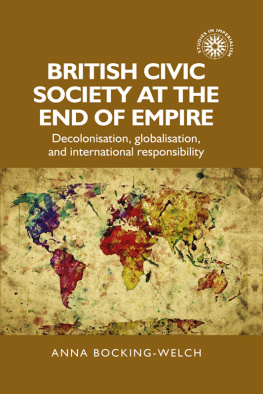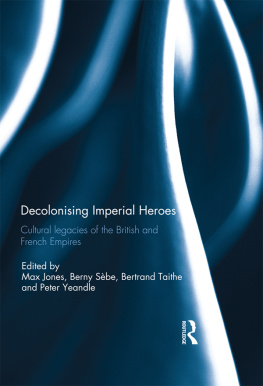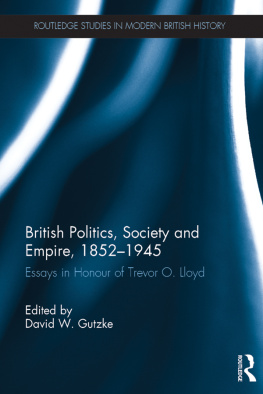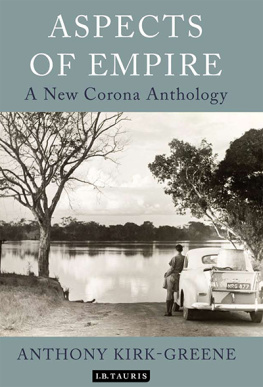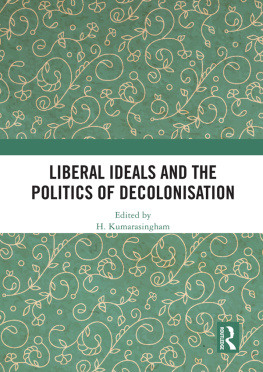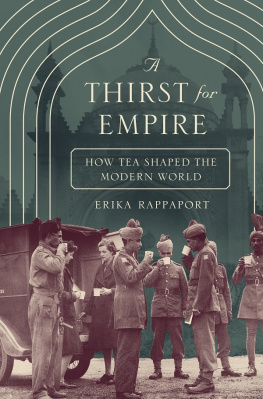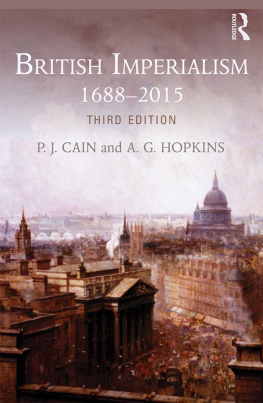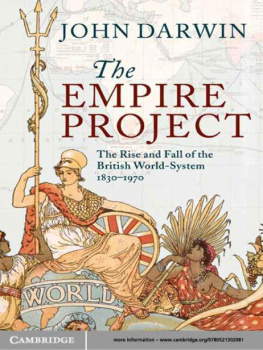General editors: Andrew S. Thompson and Alan Lester
Founding editor: John M. MacKenzie
When the Studies in Imperialism series was founded by Professor John M. MacKenzie more than thirty years ago, emphasis was laid upon the conviction that imperialism as a cultural phenomenon had as significant an effect on the dominant as on the subordinate societies. With well over a hundred titles now published, this remains the prime concern of the series. Cross-disciplinary work has indeed appeared covering the full spectrum of cultural phenomena, as well as examining aspects of gender and sex, frontiers and law, science and the environment, language and literature, migration and patriotic societies, and much else. Moreover, the series has always wished to present comparative work on European and American imperialism, and particularly welcomes the submission of books in these areas. The fascination with imperialism, in all its aspects, shows no sign of abating, and this series will continue to lead the way in encouraging the widest possible range of studies in the field. Studies in Imperialism is fully organic in its development, always seeking to be at the cutting edge, responding to the latest interests of scholars and the needs of this ever-expanding area of scholarship.
British civic society at the end of empire
SELECTED TITLES AVAILABLE IN THE SERIES
WRITING IMPERIAL HISTORIES
ed. Andrew S. Thompson
EMPIRE OF SCHOLARS
Tamson Pietsch
HISTORY, HERITAGE AND COLONIALISM
Kynan Gentry
COUNTRY HOUSES AND THE BRITISH EMPIRE
Stephanie Barczewski
THE RELIC STATE
Pamila Gupta
WE ARE NO LONGER IN FRANCE
Allison Drew
THE SUPPRESSION OF THE ATLANTIC SLAVE TRADE
ed. Robert Burroughs and Richard Huzzey
HEROIC IMPERIALISTS IN AFRICA
Berny Sbe
British civic society at the end of empire
Decolonisation, globalisation, and international responsibility
Anna Bocking-Welch
MANCHESTER UNIVERSITY PRESS
Copyright Anna Bocking-Welch 2019
The right of Anna Bocking-Welch to be identified as the author of this work has been asserted by her in accordance with the Copyright, Designs and Patents Act 1988.
Published by MANCHESTER UNIVERSITY PRESS
ALTRINCHAM STREET, MANCHESTER M1 7JA
www.manchesteruniversitypress.co.uk
British Library Cataloguing-in-Publication Data
A catalogue record for this book is available from the British Library
ISBN978 1 5261 3127 0hardback
First published 2019
The publisher has no responsibility for the persistence or accuracy of URLs for any external or third-party internet websites referred to in this book, and does not guarantee that any content on such websites is, or will remain, accurate or appropriate.
Typeset
by Toppan Best-set Premedia Limited
I am grateful to the many people who have made this book possible. First I would like to thank the Arts and Humanities Research Council who funded the PhD research that forms the foundation of this book and the World Universities Network who funded the two months I spent at the University of Washington, Seattle. Second, I am thankful to the staff at the libraries and archives I have worked at, in particular those at the Royal Commonwealth Society Archive. Third, I am grateful to all those who have commented on various parts of this book, and for the countless questions and suggestions I have received over the course of this project. I am especially grateful to Richard Huzzey for his generosity, enthusiasm, critical insight, and sharp editorial eye, particularly as I approached the final hurdle. Chris Pearson and Deana Heath, my colleagues at Liverpool, have been particularly kind with their time and advice.
I would like to express my gratitude to Liz Buettner, who was the model of a perfect PhD supervisor and whose own research has offered a constant source of inspiration. Her unwavering enthusiasm, thoughtful advice and meticulous feedback were crucial in helping to mould this project and keep me on track. Thanks also to Mark Roodhouse and Joanna De Groot whose many pointers and suggestions greatly enriched my work, and to Jordanna Bailkin whose incisive comments helped to shape a number of my case studies.
Special thanks to my mum and dad for their support and understanding. Thanks to the York Gang for suffering the PhD alongside me and keeping me sane. Without you there for coffee breaks, long lunches, pot lucks and bike rides, all the hard graft wouldn't have been possible. Thanks to Charlotte Riley and Emily Baughan; you've been a constant source of inspiration and solidarity. My final thanks go to James. For the late nights, the patient questions, the grammar policing and the endless cups of coffee, I owe you a lifetime of tea in bed. Most of all, though, thanks for keeping me company. There's not much I'd want to do without you.
| BCC | British Council of Churches |
| CAP | Capricorn Africa Society |
| CND | Campaign for Nuclear Disarmament |
| COI | Central Office of Information |
| FAO | Food and Agricultural Organisation |
| FFHC | Freedom from Hunger Campaign |
| ILN | Illustrated London News |
| LEL | League of Empire Loyalists |
| NFWI | National Federation of Women's Institutes |
| RCS | Royal Commonwealth Society |
| RIBI | Rotary International in Great Britain and Ireland |
| SOAS | School of African and Oriental Studies |
| UN | United Nations |
| VSO | Voluntary Service Overseas |
| WI | Women's Institute |
In the 1960s the world shrank for the British public. In a literal sense, they lost an empire. The start of the decade marked the most intense period of decolonisation and, by its end, more than twenty-five colonies in Africa, the Caribbean, and the Indian Ocean had gained independence. With each independence ceremony, with each newly hoisted flag, the pink area on the map retreated. But the world was becoming smaller in other ways as well. The 1960s were distinctive not just for the rapid pace of decolonisation, but also for a boom in international mobility and communications, and a concomitant surge in the establishment and growth of international agencies and organisations. As a play produced in 1964 for school children by the humanitarian organisation Christian Aid described it:
This interconnectedness made faraway places, the people that lived in them, and the things that they did there feel as if they were closer to Britain than ever before.
But it was also one in which opportunities for real and vicarious travel increased the British public's ability to see and interact with the outside world. Public attitudes towards the wider world were shaped simultaneously by this increasing interconnectedness and by the dissolution of the British Empire. This book is about the paradox of living in these two shrinking worlds about what it meant that the world felt more visible and accessible to the British public at precisely the moment that Britain lost authority over it and about the impact of that paradox on the ideas and practices of post-imperial responsibility within middle-class society.

